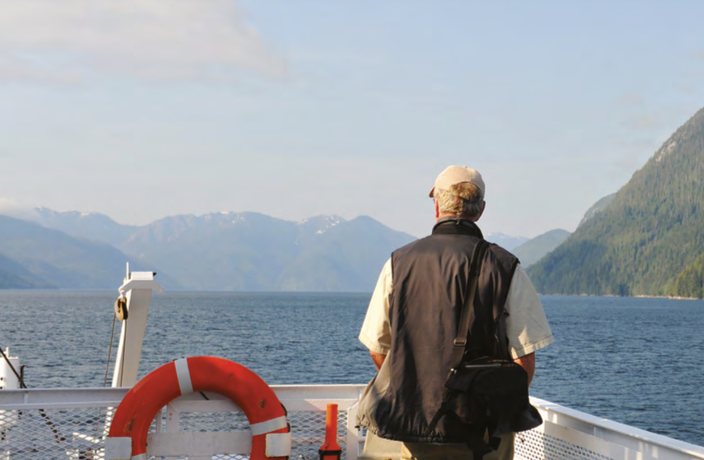By Julie Lavoie
A solo trip abroad—or even to another part of the country—can be a daunting prospect, but it can also be immensely rewarding. Here are some options and resources for a hassle-free trip.
If you’re contemplating a solo travel adventure, the first thing you should know is that a travel agency is the best way to ensure your peace of mind. While they don’t all offer the same services, knowing that you have someone you can contact in case of a problem is reassuring. “Going with an agency and getting advice before you leave is always helpful,” says Isabelle Eon, owner and president of Dessine-moi un voyage, which offers only private and custom trips.
As well as being familiar with the nuts and bolts of the tourist industry, travel agents are up to speed on such things as which documents you’ll need and any restrictions and prerequisites for each destination—the sort of details that can change frequently. On top of that, organizing a trip yourself takes a lot of time and mistakes are common, even among experienced travellers.
Aurélie Cartier, director of Voyageurs du monde, says she’s been seeing an increase in the number of solo travellers since the pandemic. “They’re looking for security and support,” she says. “If their luggage is lost, for example, we follow up with the airlines and look after claims.” Another advantage, in her view, is that a concierge service gives you a contact in each place you visit, for your entire stay; you can count on immediate assistance if something goes wrong.
Cartier’s company also offers, for an additional fee, the services of a “local friend.” “This is someone who may not be trained as a guide but will introduce people to their city and their country, based on the client’s interests.”
Do It Yourself
What if you prefer to be independent? Even if you’re a seasoned traveller, you’ll find it helpful to make a list (or lists!) so you don’t forget anything. The choice of destination is also crucial. For example, to avoid potential problems, you can choose a country or an area where you understand the language. If you’re more adventurous, it’s a good idea to learn at least a few key phrases.
When you arrive at your destination, book a guided tour. Besides helping you get oriented, a tour will allow you to connect with other travellers. Another good idea is to spend a little time with a member of the International Greeter Association (internationalgreeter.org). This not-for-profit organization, founded in New York in 1992, brings together volunteers who share their love for their city during a two- to three-hour guided walking tour.
Counting the Cost
As a general rule, travelling alone costs more. To save money, consider getting around on foot and by public transit and shopping at markets instead of eating at restaurants. You should also get a new SIM card for your phone for the whole trip, because prices in most countries are much more attractive than those in Canada.
Eon says that most prospective solo travellers who come to her agency change their minds because of the higher costs. But beyond the budget, she mentions the emotional aspect. “Travelling solo also means not sharing what you’re experiencing,” she points out. “Sitting alone in a restaurant and not talking about the day’s discoveries isn’t for everyone.”
If you don’t want to spend your whole trip talking to yourself, you could join an organized group, which has the added advantage of being reassuring for novices. Voyages Gendron has a pairing option to save you money on single-accommodation supplements, or you can join a group that isn’t aimed specifically at solo travellers. This way, people who love hiking, for example, can get together with other hikers. There are lots of good options—it’s just a matter of finding the one that suits you best.
The Voice of Experience
A young 60-something, Claire McKenna has done months-long stays in Mexico and Bolivia over the past decade. How does she prepare? “Before I leave, I think about the main risks: what are they, and what can I do to avoid them?” And what about violence? “I have good instincts, and I avoid people who seem dubious,” she says. “I don’t think twice: if I feel uncomfortable or sense danger, I leave. I respect my intuition, and I follow it. It’s hard to explain. I find that people often ignore their instincts. It’s not something mystical—it’s fuelled by life experience.” Meeting women of the same age from local communities is also important to her. “There’s a kind of connection that forms, and you don’t feel alone,” McKenna explains. She also avoids attracting unnecessary attention. “I always dress simply when I’m out walking around. I don’t wear jewellery, I don’t carry expensive equipment, and I have an old backpack.”
Things to Keep in Mind
- For safety reasons, make sure that at least one family member or friend has your itinerary.
- Register with the embassy of the country you are visiting.
- Before you go, visit the official websites of your destinations as well as that of the Government of Canada, which publishes a list of advice and advisories for each country.
- Don’t forget to get travel insurance!
- Check the health situation of the countries you plan to visit. If you want to get the recommended vaccines, book your appointment as early as you can.
- Ask your pharmacist which medications to bring.
- Travel as light as possible.
- Make hard copies of your passport and travel documents. (Cellphone batteries don’t last forever!) Bringing one or two replacement batteries is also a good idea.
A Few Good Options
More and more companies aren’t applying the usual “single supplement.” Transat, for example, offers an all-inclusive Solo Collection of vacations, while Club Med has a “No single supplement” promotion in some villages. Those who enjoy cruises can check out the options for singles and solo cruises by Norwegian Cruise Line, which has been voted Porthole magazine’s Best Cruise Line by solo travellers six years in a row.






